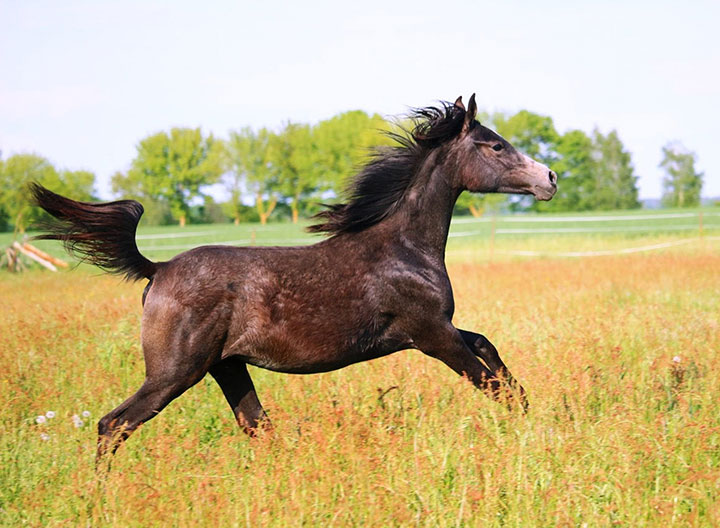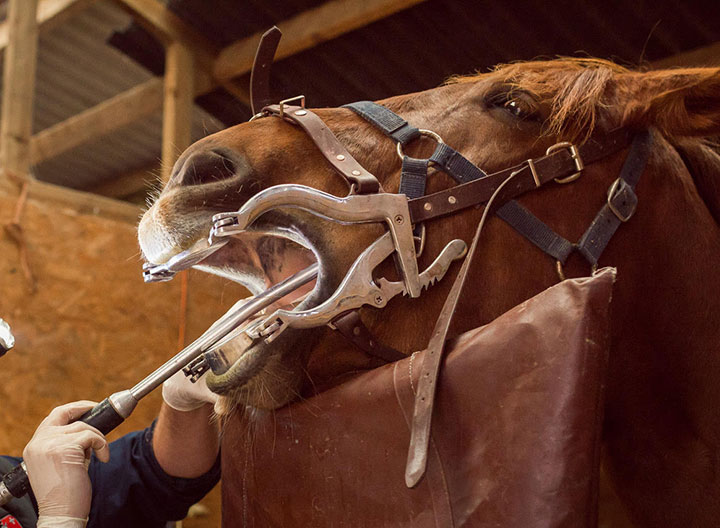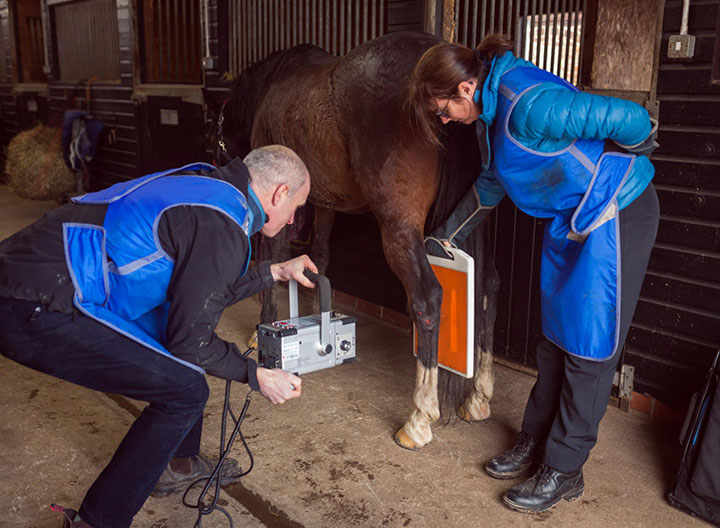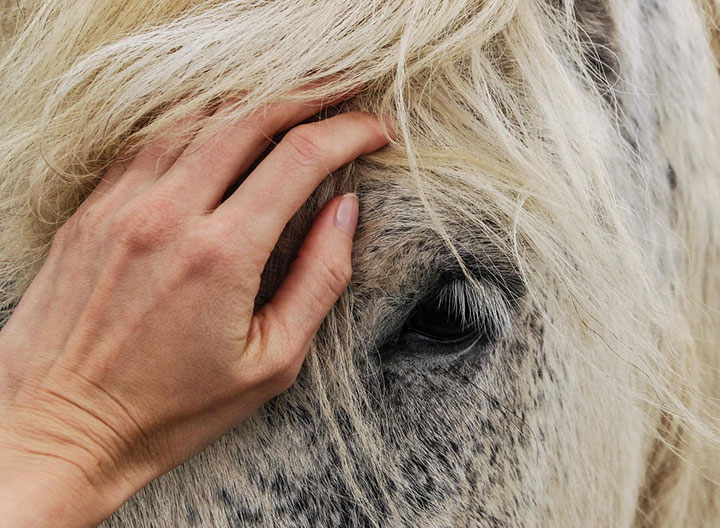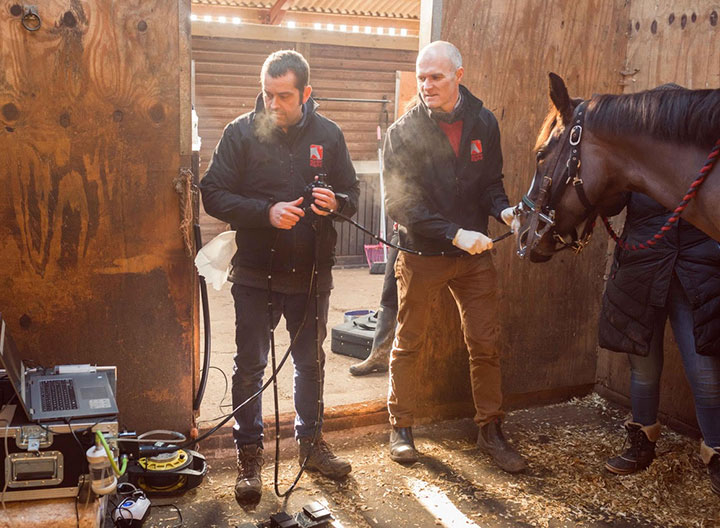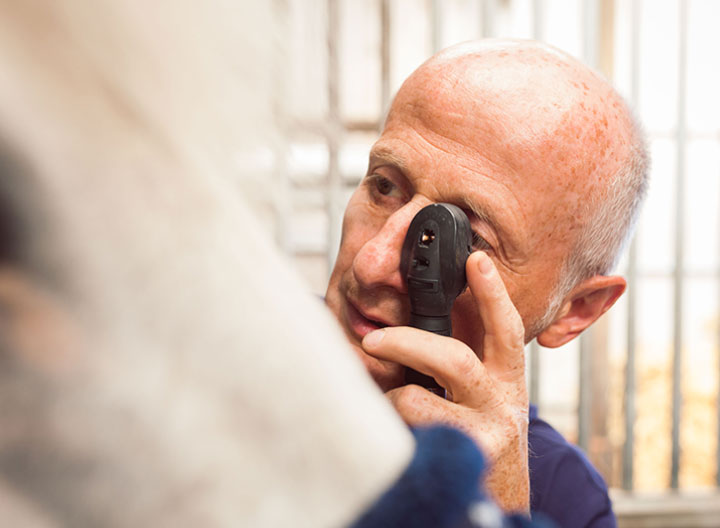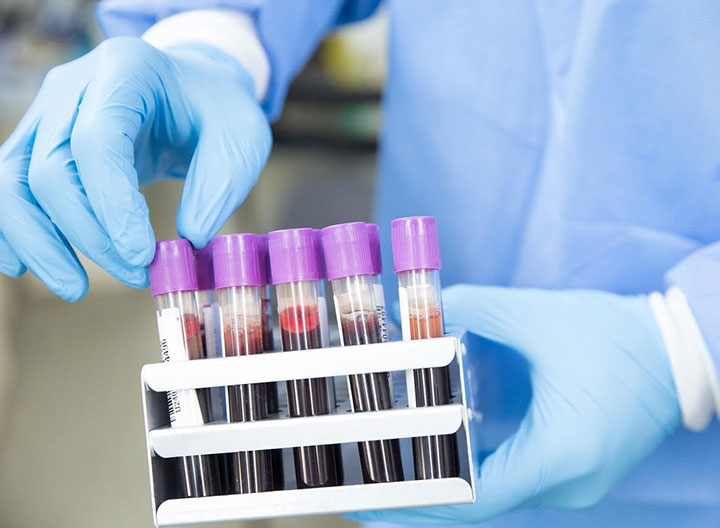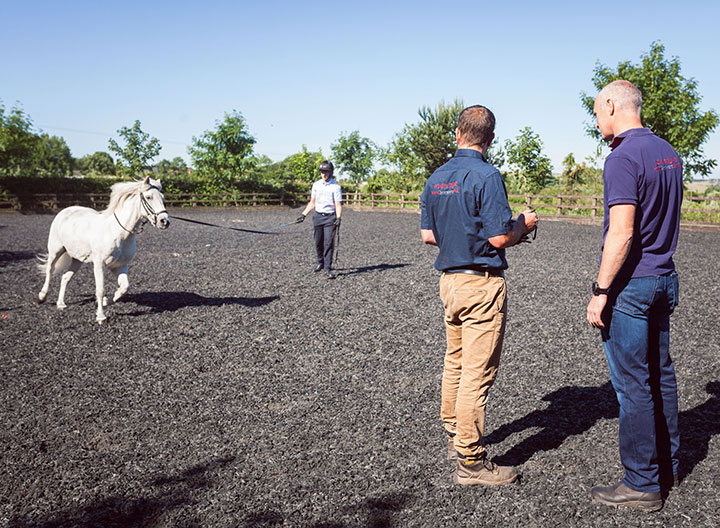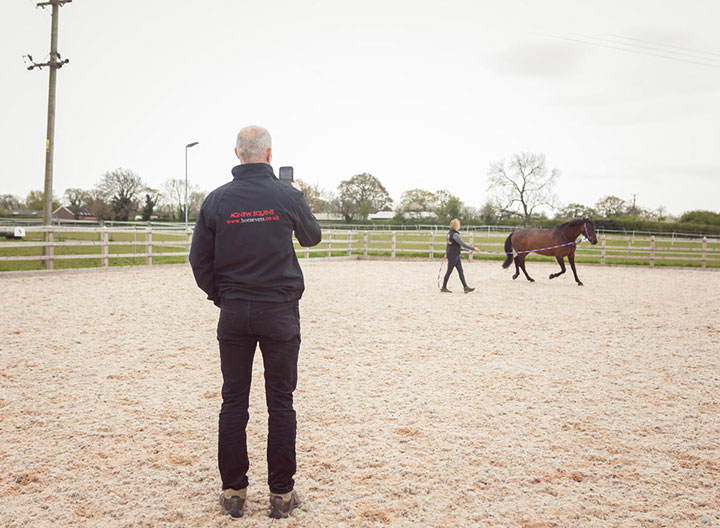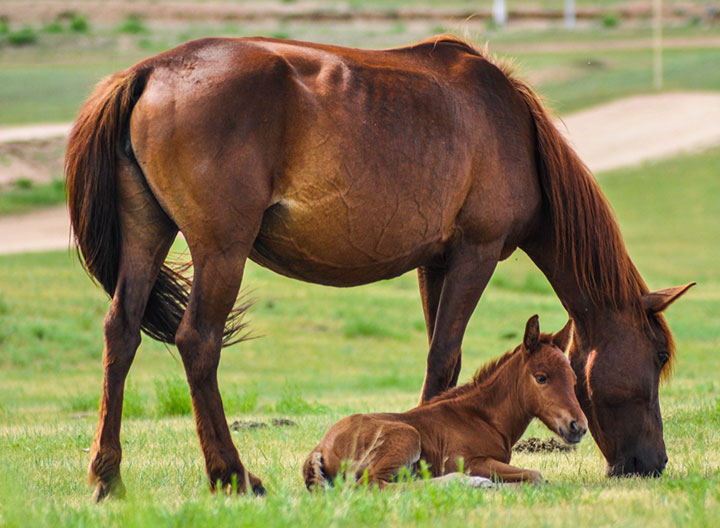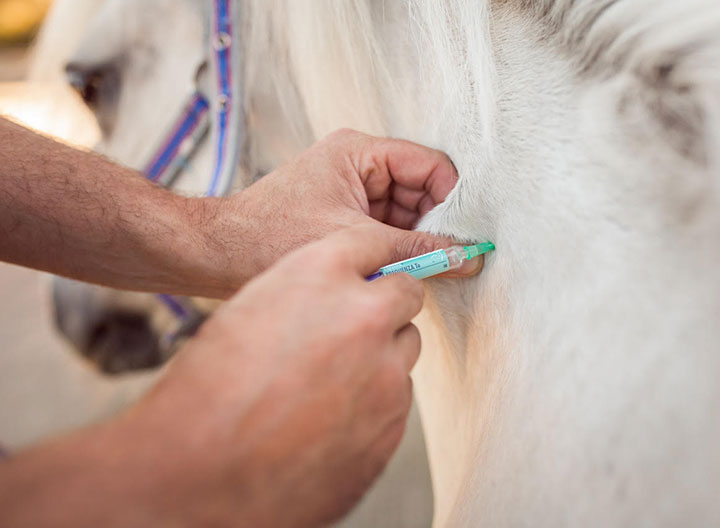Worming
A worming (or rather, de-worming!) programme is an essential part of your horse’s management as these parasites can cause a wide range of problems from weight loss to colic and diarrhoea. As vets, the days of blanket worming are over as we are now aware of how resistance to wormers is built up with that approach - instead a more strategic and thoughtful system of tackling worm burdens is the responsible way to proceed. We don’t need to get rid of all worms, we just need them to stay below the levels that cause disease. Worms have the potential to cause considerable health problems for your horse, so it is best to stay informed and a step ahead.
Worming Programme
A worming programme involves a proactive approach to worm control in your horse. The two objectives of a worming programme are:
- Killing and removing worms already inside the animal
- Aiming to reduce the risk of re-infestation
The way we suggest meeting these objectives is the following:
- Pasture management: Removing droppings (or poo-picking) from the pasture regularly. Regular collection of droppings is essential to reduce the build-up of worm eggs in the pasture and to prevent the development of latrine areas. Droppings should be collected at least twice weekly during the spring and summer months and at least weekly during the autumn and winter. Droppings must be removed completely - and only after storage for 6 months in an effective muck heap where the high temperatures will kill the eggs can the droppings be considered safe to spread on the pasture. Also to be considered in pasture management is rotational grazing, low stocking density - i.e. 1 - 1.5 acres of paddock available per horse, and co-grazing with other species, for example, sheep.
- Identify and monitor horses with significant worm burdens: Faecal worm egg counts (WEC) are how we identify the horses with significant intestinal worm burdens and continue to monitor them.
- Use chemical treatments in the most effective way possible: If it is determined through the WEC that your horse has a high worm burden that is likely to result in causing disease, our vet will suggest the most effective treatment bearing in mind your specific case and create an ongoing plan for treatment and monitoring.
If your horse shares a paddock with others, we recommend all horses have a worming program and do them at the same time. 80% of worms & parasites are in 20% of horses, so if there is one horse carrying a high worm burden and you treat them, the source of the worms is removed and will prevent spreading to others.
Agnew Equine has a Strategic Worming Plan that provides a full 12 months of protection.
- Included in our Worm Packs are 3 Worm Egg Count (WEC) kits – the first sample is recommended to be collected and submitted to us in April, the second sample in June/July and the third in Sept/Oct every year.
- Tapeworms and Inhibited Small Red Worms cannot be accurately assessed by WEC – so to address this each pack contains targeted treatment of Equest Pramox against these worms to be given in late autumn/early winter.
- Our Worm Packs are not only effective, but also great value and included is advice from our team and vets. Expert interpretation of results of Worm Egg Counts is important.
Please call the office on 01782 510 502 to order your Worm Packs or with any questions email on office@horsevets.co.uk
How Do I Know If My Horse Has Worms?
There are various ways to detect if your horse may have a high worm burden. Signs of a worm burden may include:
- Worms are seen in the droppings
- Recurrent colic, poor growth, diarrhoea, weight loss
- Faecal Worm Egg Count – eggs detected by a lab analysing the horse’s droppings
- Blood Sample detecting antibodies to Tapeworm
- Blood sample showing anaemia and low protein levels
- Sellotape test detecting Pinworm eggs (horse may be itching tail head)
At our practice, the cut-off value that we use for treatment is 400 epg. Anything below this value is thought of as a ‘healthy exposure’ - provided the above pasture management controls are implemented. Anything above 400 epg, we recommend treatment with a wormer. Which one is recommended by your vet will depend on the time of year and what has been previously used on your horse. Please bear in mind that worm egg counts are helpful, but the results of a one-off worm egg count should be interpreted with caution. There could be a burden of worms present which is made up of larval forms which do not lay eggs and/or non-egg-laying adults (e.g. in the winter time). These animals would show up with a zero or low worm egg count result but actually have a significant burden. Worm egg counts performed over a period of time can give a clearer picture of a worm situation, and are vets are there to work with you and advise along the way.
What Are The Most Common Worms In Horses?
There are a large number of worms/parasites that can affect the horse. The signs that we see may depend on the age of the animal, concurrent illness, depressed immune system, worming status as well as the number of worms affecting the animal. Below is a list of some of the more common worms to affect horses and a bit about their life cycle. Worms, like most living things have a breeding season, therefore egg outputs are usually a lot higher in the Spring and Summer months.
- Small Red Worms (Cyathostomes): These are the most common worms to affect horses. The life cycle from ingesting larvae on the pasture to egg-laying adult can take 3-4 weeks. The significance of this worm is when it hibernates in the gut wall forming tiny cysts. This effectively ‘hides’ them away from the action of the majority of wormers. If these encysted larvae emerge in late winter/early spring in vast numbers, they can cause large amounts of inflammation in the gut wall resulting in loss of condition, diarrhoea and even death.
- Large Red Worms (Strongyles): Due to the response to the majority of wormers, this parasite is no longer seen in horses. It used to be responsible for some types of colic.
- Large Round Worms (Ascarids): These most commonly affect foals and young horses. The life cycle is such that the eggs which can survive in stables and on pasture for several years, are ingested by a susceptible individual. The eggs develop into larvae and migrate through the lungs to the intestines often resulting in a cough. Once in the gut they develop into adults reaching lengths of up to 40cm. Depending on the number of adult worms, they can interfere with normal gut function causing poor growth and condition, colic and sometimes death.
- Threadworms: This is another worm to affect foals. The larvae can cross from the mare to the milk and result in large infestations in susceptible individuals. This can result in poor growth, diarrhoea, anaemia. Most foals will develop their own immunity by 6 months of age.
- Pinworms: The female of the pinworm migrates to the horse’s rectum. There they lay their eggs causing itching and irritation similar to children affected by pinworms. Affected horses will scratch the tail head, sometimes giving the impression of a horse with sweet itch.
- Tapeworms: Tapeworms can grow up to 8cm in length and 1.5cm in width. The eggs are ingested off the pasture with the forage mite being the intermediate host. Recent evidence has suggested that the forage mite survives well in bedding and hay so what was once thought to be a seasonal problem should now be attended to all year round. The worm preferentially lodges at the junction of the small and large intestine and in large numbers can cause a complete blockage necessitating surgery. Tapeworm has been linked to spasmodic colic and is thought to be responsible for up to 20% of the cases seen.
- Lungworm: Donkeys are the natural host for Lungworm and in even in high numbers they don’t cause any symptoms. However if horses are affected they can have a chronic cough.
- Bots: These are not thought to cause any problems in horses. Flies lay sticky eggs on the horse’s coat which are licked off. The eggs will develop into bots which travel uneventfully through the GI tract. Occasionally we see penny sized areas of ulceration on horse’s lips which are thought to be as a result of bot larvae and resolve when the horse is wormed.
By reading about the types of worms that can affect horses and the life cycles of them, it makes it a little easier to understand why we target certain times of year for worming and why we concentrate more closely on certain individuals such as foals or pregnant mares.
What Are The Different Types Of Wormer?
There are many different wormers on the market which can make choosing the appropriate one more difficult. There are, in fact, only a small number of drugs that are used to kill worms and larvae in horses, many of the products contain the same drug(s) but are called a different name making it even more confusing!
IVERMECTIN
- Kills ADULT worms
- Duration of action 8-10 weeks
- Used throughout the Spring and Summer
E.g. EQVALAN®, BIMECTIN®, ERAQUELL®, NOROMECTIN®
MOXIDECTIN
- Kills ADULT and LARVAL forms
- Duration of action 13 weeks
- Single dose required in the winter
E.g. EQUEST®
FENBENDAZOLE
- Kills ADULT and LARVAL forms (at higher dose rate)
- Widespread resistance
- Duration of action 6-8 weeks
E.g. EQUITAPE®
Combi IVERMECTIN + PRAZIQUANTEL
E.g. EQVALAN DUO®, EQUIMAX®
Combi MOXIDECTION + PRAZIQUANTEL
E.g. EQUEST PRAMOX®
ALWAYS CHECK THE DATA SHEET FOR SUITABILITY OF A PARTICULAR WORMER BEFORE USE FOR PREGNANT MARES AND FOALS etc.
What Is The Difference Between The Wormers And What Shall I Use And When?
The main difference between the wormers available is the spectrum of worm forms that they kill i.e. adults only or adults and larval forms. Therefore, if we only administer wormers that kill the adults we will need to dose more frequently to kill the new adults that have hatched.
Most wormers are available in a paste, but some come as chewable flavoured tablets (e.g. Vectin chewable®) and Panacur® is available in liquid form or granules are available as well.
How Do I Administer A Wormer?
- Firstly weight tape the horse for accuracy (under dosing can lead to resistance)
- Ensure the correct dose is measured on the syringe
- Put the wormer in the horse’s mouth at the back of the tongue
- For horses that are difficult to worm, then administer the dose in the feed
- It is not necessary to keep the horse box rested after worming
- Where possible, keep other horses grazed on the same paddock on the same worming programme as your own
- Any new horses on a yard should be kept isolated for 2 weeks in an ideal world and wormed in this time - preferably with an Equest Pramox®
Myths About Wormers
Herbal wormers have no scientific basis. Whilst we aim to keep the number of drugs administered to horses as low as possible, without any your horse is at an increased risk of illness as a result of worms. We therefore recommend talking to a vet for advice.
Our staff are well-informed, so please contact the practice if you have any questions or to request a Strategic Worm Pack.

